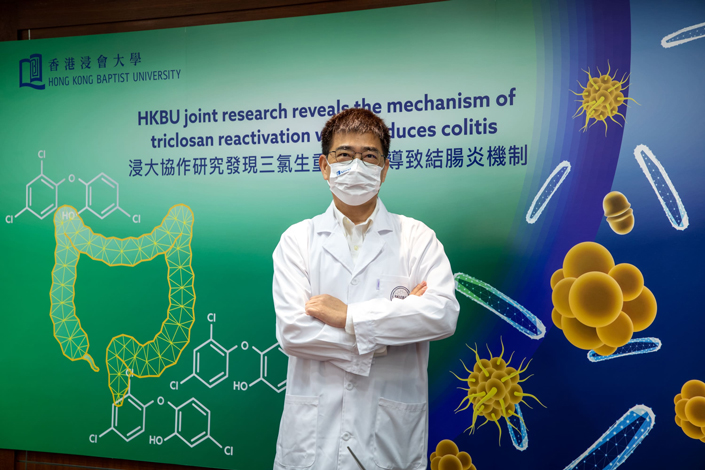2022-05-03

HKBU joint research reveals that gut microbial enzymes reactivate triclosan which induces colitis
A Hong Kong Baptist University (HKBU) collaborative research study has revealed that certain gut microbial enzymes mediate the reactivation of triclosan (TCS) from its inactive glucuronide metabolite. TCS is an antimicrobial agent commonly used in a wide range of consumer products, and it is associated with the development of colitis.
The research results have been published in Nature Communications, an international scientific journal.
Mechanism of TCS exposure leading to colitis previously unclear
TCS is widely used as an antimicrobial agent in consumer products such as toothpaste, mouthwash, hand sanitisers, cosmetics and toys. It is a major environmental contaminant, and it has been shown that TCS exposure increases the risk of colitis.
Once TCS enters the human body, it is rapidly metabolised to form the biologically inactive metabolite TCS-glucuronide (TCS-G), which is easily eliminated from the body. Due to this characteristic, the mechanism of how environmental exposure to TCS leads to gut toxicity in the human body has previously remained unclear.
To answer this question, a research team co-led by Professor Cai Zongwei, Chair Professor of the Department of Chemistry and Director of the State Key Laboratory of Environmental and Biological Analysis at HKBU; Professor Matthew R Redinbo from the University of North Carolina at Chapel Hill; and Professor Zhang Guodong from the University of Massachusetts Amherst conducted a research study based on the hypothesis that certain gut microbial enzymes act on TCS-G in the gut, leading to the reactivation of TCS and the subsequent development of colitis.
Click here for detail.